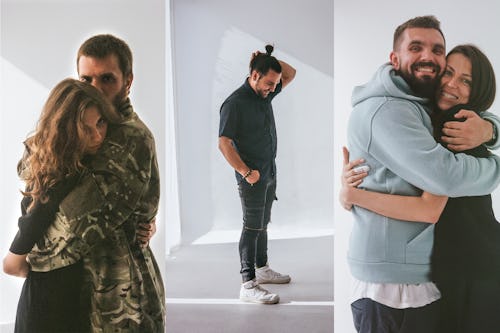
Russia’s war on Ukraine has disrupted the lives of millions. Many people fled their homes when mounting evidence of the impending “special military operation” surfaced. As the country’s economy nosedived and the possibilities of work and earning a living wage evaporated, Ukrainians have pivoted their careers and reinvented themselves for the sake of survival. And while Ukrainians fight for its freedom, it’s young people — the future of the country — who are leading the charge. History has shown that wars are not just fought with guns; they are fought with art and stories by creatives with the capability to fortify hearts and minds. These are some of the brave young Ukrainians who have remained in the nation’s capital despite the continued stark realities of war.
Michael Fostik | Михайло Фостик
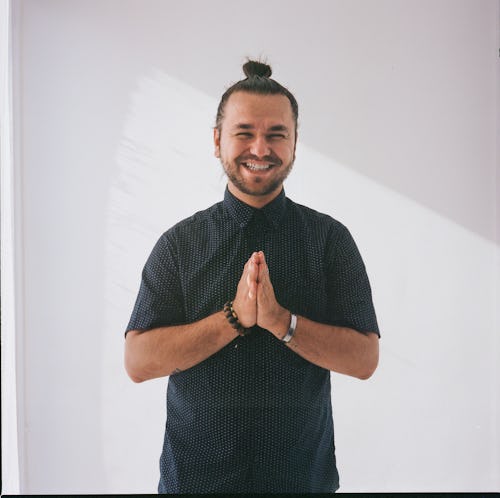
Profession: Director, Cinematographer
Age: 32
Michael Fostik, a director and cinematographer by trade, resides in London but returned to Ukraine during the COVID pandemic to be closer to family. He was shooting commercial and creative projects while in his home country, but just as the pandemic began to wind down, news of a potential war with Russia started to spread. At the beginning of February, Michael relocated his mother and grandmother from Kyiv’s northern suburbs to his hometown in Transcarpathia, a remote region in western Ukraine. His family initially resisted immediate evacuation, but in time, Michael’s insistence would prove vital. Russia’s invasion began on Feb. 24, 2022, and within a matter of days the Russian military was within reach of the family’s by-then-vacant home.
Once Michael moved his family to safety, he had planned to return to the U.K. “My life was in London,” he tells Mic. “I have an apartment there, I had jobs lined up, everything was waiting for me, and then overnight it suddenly stopped.” Less than 24 hours after Russia invaded, Ukrainian President Volodymyr Zelensky signed a decree of martial law that banned male citizens ages 18 to 60 from leaving the country, in case they were needed to defend their homeland. So Michael stayed in Kyiv. “Before [the war], I could travel everywhere. I’d constantly work in various parts of Europe. Now as a Ukrainian man, this is nonexistent,” Michael says. “We look at our foreign friends’ stories and posts on social media, enjoying their summers, living their lives, and you can only imagine how we feel as young people in Ukraine.”
Beyond being physically constrained within his country’s borders, Michael’s creativity was restricted by the conflict too. “The digital and creative content being produced in the country is centered around war,” he says. “There isn’t capacity to create in other genres or to cover anything else; it’s not relevant. As a result, there’s currently an undeniable heaviness in our culture.”
So, Michael pivoted to journalism, covering the unfolding conflict in order to make ends meet. He visited the front lines as Russia’s army made advances on the capital. Ukraine’s Armed Forces required that individuals reporting to the war zone have their own body armor, but Michael knew that it would be nearly impossible to acquire a bulletproof vest during the chaos. He tried to be resourceful and ordered a flak jacket on Amazon. But when it arrived, the vest was empty; the essential Kevlar was not included.
In true Ukrainian spirit, Michael filled the lining of the vest with books instead and headed towards combat. Michael says he deliberately selected the books that would serve as makeshift armor: “I chose carefully. I couldn’t just fill it with any random book! I chose books that meant something to me.” The literature ended up coming in handy when he was forced to retreat to a bunker for several days. He passed the time by removing and reading the books one by one. When he emerged from the bunker, he says, someone remarked that his vest looked different.
“I’d finished all the books by that time and left them behind,” Michael says.
Viktoriia Petrova | Петрова Вікторія
Oleksii Stepankov | Степанков Олексій
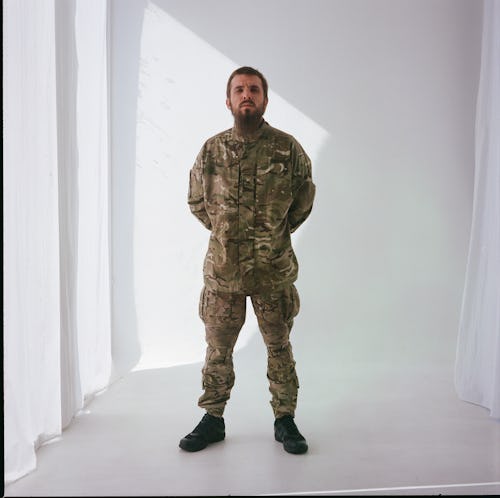
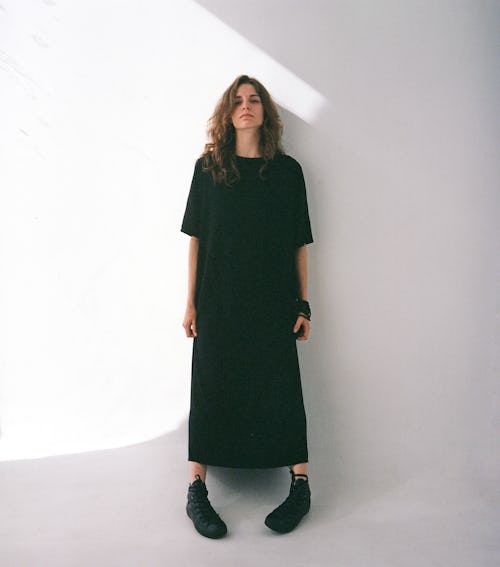
Her profession: Choreographer
Her age: 23
His profession: Artist
His age: 30
Viktoriia Petrova and Oleksii Stepankov are a husband and wife who have been separated by the war. A trained dancer, Viktoriia has worked as a choreographer in independent theater productions, specializing in modern dance with a focus on free form. “Improvisation is imagination,” she says. Oleksii is an artist and director of photography who works in theater, cinema, and sculpture. He works with materials in their natural surroundings to combine textures and light, allowing the imaginations of viewers to interpret their own stories. Oleksii comes from a legendary family of artists: His grandmother is the famous theater and cinema figure Ada Rogovtseva.
Since Feb. 24, the lives of Oleksii and Viktoriia have completely changed. On the second day of Russia’s invasion, Oleksii joined the Ukrainian Volunteer Corps for the defense of Kyiv. After Russia’s military retreated, he joined the Armed Forces of Ukraine and was deployed to the Donbas region in eastern Ukraine, while Viktoriia has remained in the capital city.
Viktoriia describes how their priorities shifted: “Men fight, and the volunteer movement rests on the women left behind. The theater that our family is involved in has become a volunteer center. Instead of rehearsals, we’re coordinating humanitarian aid.” On March 27, the International Day of Theatre, Viktoriia, along with others from her theater troupe, helped organize an evening of poetry for Ukraine’s military. “We continue to hold theatre performances and film screenings whenever possible to support the Armed Forces,” Viktoriia shared. She has held dance workshops since Russia’s invasion, and she sends all the proceeds to her husband’s unit in the military.
Facing long periods of separation, the couple is never sure exactly when they’ll be able to see each other. So they communicate through art. Viktoriia sends videos of her improvisational dances, and Oleksii sends back photo collages from the front lines. Viktoriia insists that the “four days of vacation with him once every few months is still a gift.” Of course, even when Oleksii is on “vacation,” he continues to check in with his unit and deal with internal military affairs, “We know what we are sacrificing and fighting for,” he says. “We dream of a free Ukraine and of love. This is our salvation.”
Bogdan Zhdanov | Богдан Жданов
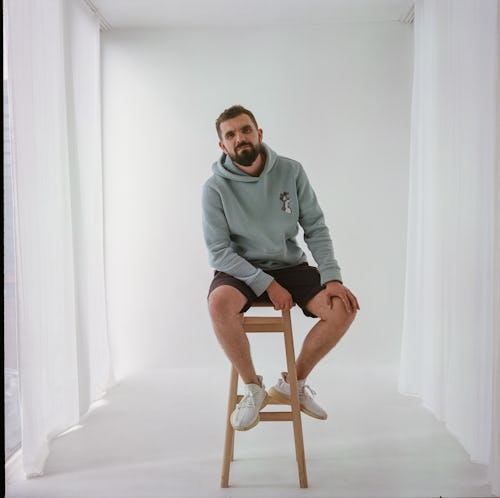
Profession: Actor
Age: 28
When asked about the war and how he’s holding up, actor Bogdan Zhdanov shares mixed emotions. He recently returned from a trip to Eastern Ukraine where he collected the body of a friend, a casualty of war. “We all cry these days. It’s okay. We cry and then we carry on,” he says. He smiles warmly, but there’s a glint of sadness in his eyes.
It’s not just the continued loss of human life and the elimination of work in Ukraine that has Bogdan worried. It’s also the fear that the war will drag on. “I’m afraid that my culture will be destroyed, and that Russia will not stop,” he explains. But rather than give in to turmoil, Bogdan has motivated himself and steered his focus from acting to documenting Russia’s war, its atrocities, and the aftermath. Since the war started, Bogdan has traveled across the country — including to some of the most dangerous areas, like Mykolaiv and Kherson — to interview fellow Ukrainians. He hopes to capture the truth and challenge the misinformation war about Ukraine that Russia has launched. His long-term mission is to create a documentary film highlighting people’s stories. He’s been able to crowdfund the project.
“Some people found themselves through this war and others lost themselves,” Bogdan says. “I’ve seen it break a lot of individuals, and I too feel a little broken at the moment, but I am holding on.”
Vladyslava Shliamina | Владислава Шляміна
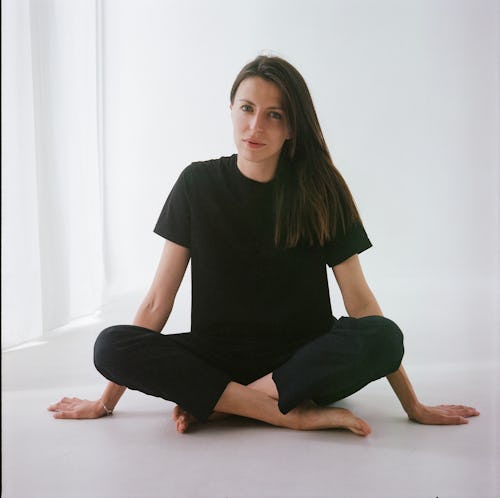
Profession: Line Producer
Age: 31
Like most Ukrainians, Vladyslava (Vlada) Shliamina has lost a lot in recent months. Due to the upheavals of war, she had a miscarriage, she had to move homes, and she now is without work. Before productions ceased, Vlada was a line producer. She’d create budgets for film projects and assist with logistics on a range of productions, including HBO’s recent series Chernobyl. But now, the only jobs that exist are documentaries or digital content relating to the war and humanitarian aid “that are either very low paying or [have] no budget,” she says.
Vlada has transitioned to working as a translator. She plans to assist on the front lines with media outlets. “I want to offer my services where I am needed,” she says. “I know that I’d be useful for foreign journalists, and it’ll help the world better understand the situation in Ukraine.”
During her free time, Vlada sews bulletproof vests and tactical clothing for the military. “The tragedy is that every day we are losing people. Not just members of the military, but innocent civilian lives,” she says. In spite of this, she stays positive — and defiant. “I have support from fellow Ukrainians,” she says. “You can’t imagine the amount of compassion in our country at present. Just walking down the street you’ll meet strangers and start a conversation, establishing an immediate connection and bond.”
“We are united as a nation, and we are not giving up.”







